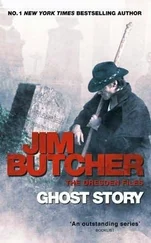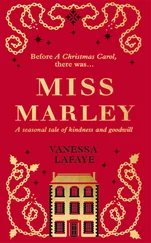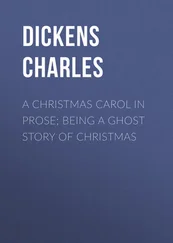“How very extraordinary we should have never found this passage!” exclaimed my host; “and no steps too—so curious—just a level passage.”
In a moment, when we got into the room, we gazed in silence and awe. Lord Glencoine took the candle from me, and kneeling down on the floor examined it. There, scattered about, were bits of old stuff—rags, they might be called—and amongst them was a skull and some bones .
“It is what I suspected,” he said, in a low, hushed tone: “bones—human bones. It means that that poor lady must have come here to hide the jewels, and the door must have been shut upon her, and she died an awful death. Even after these hundreds of years, how terrible it seems!”
The horror of what he said was upon us, and for a moment we stood solemnly gazing at the human tragedy of many years ago. Then, recovering himself, he turned to the butler.
“Come,” he said—“the crowbar.”
I pointed to the stone, and in a moment they had lifted it; and there, lying in scattered and careless profusion, were the celebrated jewels of Eleanor, Lady Glencoine, for the sake of which she had gone to meet this terrible death.
In silence we lifted them out—diamonds, rubies, the pearls, the girdle of the picture—none were missing; together with heaps of smaller necklaces and other ornaments. We carried them into the daylight and the gallery, where Lady Glencoine was anxiously awaiting us.
“Far beyond our wildest hopes,” said her husband, in a low voice. “Taverndale is saved, and to you,” turning to me, “we are indebted for this.”
I shook my head. It was not I. I was only the instrument—the medium. But it was no use saying this now, and I had had enough. Mind and body alike both craved for rest, and I left them and went to my room. That night I slept without a waking thought. If the Phantom Lady came to me, my sleep was far too deep to be disturbed; but I think her work was done, and that she too was taking her rest.
My story is over.
Perhaps some will like to hear that the Glencoines, saved by the many thousands their jewels realised, still live on at Taverndale.
The day after the discovery they reverently gathered up the remains of Eleanor, Lady Glencoine, and placed them in a corner of the churchyard; and, often as I have been to Taverndale since that time, and inhabited again and again that same room, I have never once felt that strange presence. My own belief is, that her weary steps will nevermore tread that long gallery, and that she has gone to her rest, for which she had sought so long.
But the mysteries, to us, of these things always remain. The spirit world is so near us, and we are mostly so unconscious of it, so slow to believe it; and, although bordering on it, we have so little faith and so little insight. Many break their hearts or go mad in seeking to unravel it. Some day, somehow, it will come to us, and we shall know it. Till then, let us wait—wait—wait.
THE WATER GHOST OF HARROWBY HALL,
by John Kendrick Bangs
Originally published in Harper’s Weekly Magazine , June 27th 1891.
The trouble with Harrowby Hall was that it was haunted, and, what was worse, the ghost did not merely appear at the bedside of a person, but remained there for one mortal hour before it disappeared.
It never appeared except on Christmas Eve, and then as the clock was striking twelve. The owners of Harrowby Hall had tried their hardest to rid themselves of the damp and dewy lady who rose up out of the best bedroom floor at midnight, but they had failed. They had tried stopping the clock, so that the ghost would not know when it was midnight; but she made her appearance just the same, and there she would stand until everything about her was thoroughly soaked.
Then the owners of Harrowby Hall closed up every crack in the floor with hemp, and over this were placed layers of tar and canvas; the walls were made waterproof, and the doors and windows likewise, in the hope that the lady would find it difficult to leak into the room, but even this did no good.
The following Christmas Eve she appeared as promptly as before, and frightened the guest of the room quite out of his senses by sitting down beside him, and gazing with her cavernous blue eyes into his. In her long, bony fingers bits of dripping seaweed were entwined, the ends hanging down, and these ends she drew across his forehead until he fainted away. He was found unconscious in his bed the next morning, simply saturated with seawater and fright.
The next year the master of Harrowby Hall decided not to have the best spare bedroom opened at all, but the ghost appeared as usual in the room—that is, it was supposed she did, for the hangings were dripping wet the next morning. Finding no-one there, she immediately set out to haunt the owner of Harrowby himself. She found him in his own cozy room, congratulating himself upon having outwitted her.
All of a sudden the curl went out of his hair, and he was as wet as if he had fallen into a rain barrel. When he saw before him the lady of the cavernous eyes and seaweed fingers he too fainted, but immediately came to, because the vast amount of water in his hair, trickling down over his face, revived him.
Now it so happened that the master of Harrowby was a brave man. He intended to find out a few things he felt he had a right to know. He would have liked to put on a dry suit of clothes first, but the ghost refused to leave him for an instant until her hour was up. In an effort to warm himself up he turned to the fire; it was an unfortunate move, because it brought the ghost directly over the fire, which immediately was extinguished.
At this he turned angrily to her, and said: “Far be it from me to be impolite to a woman, madam, but I wish you’d stop your infernal visits to this house. Go sit out on the lake, if you like that sort of thing; soak the rain barrel, if you wish; but do not come into a gentleman’s house and soak him and his possessions in this way, I beg of you!”
“Henry Hartwick Oglethorpe,” said the ghost, in a gurgling voice, “you don’t know what you are talking about. You do not know that I am compelled to haunt this place year after year by my terrible fate. It is no pleasure for me to enter this house, and ruin everything I touch. I never aspired to be a shower bath, but it is my doom. Do you know who I am?”
“No, I don’t,” returned the master of Harrowby. “I should say you were the Lady of the Lake!”
“No, I am the Water Ghost of Harrowby Hall, and I have held this highly unpleasant office for two hundred years tonight.”
“How the deuce did you ever come to get elected?” asked the master.
“Through a mistake,” replied the specter. “I am the ghost of that fair maiden whose picture hangs over the mantelpiece in the drawing-room.”
“But what made you get the house into such a spot?”
“I was not to blame, sir,” returned the lady. “It was my father’s fault. He built Harrowby Hall, and the room I haunt was to have been mine. My father had it furnished in pink and yellow, knowing well that blue and gray was the only combination of colors I could bear. He did it to spite me, and I refused to live in the room. Then my father said that I could live there or on the lawn, he didn’t care which. That night I ran from the house and jumped over the cliff into the sea.”
“That was foolish,” said the master of Harrowby.
“So I’ve heard,” returned the ghost, “but I really never realized what I was doing until after I was drowned. I had been drowned a week when a sea nymph came to me. She informed me that I was to be one of her followers, and that my doom was to haunt Harrowby Hall for one hour every Christmas Eve throughout the rest of eternity. I was to haunt that room on such Christmas Eves as I found it occupied; and if it should turn out not to be occupied, I was to spend that hour with the head of the house.”
Читать дальше












